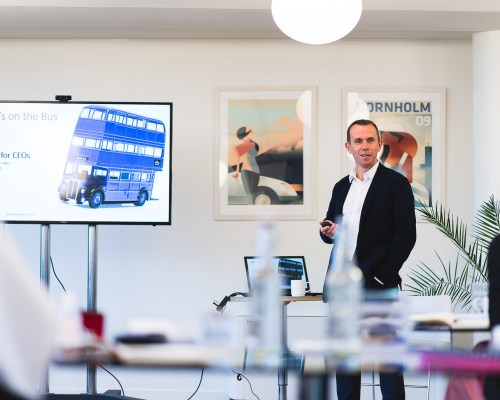We recently spoke with Jason about his remarkable life and career so far, as part of our Leadership Insights podcast. You can listen to the full episode HERE.
Originally from Colorado, Jason joined the Tattoo with over 10 years’ experience in the hospitality industry and has held various Chief Executive and Management roles in the US.
Prior to this, Jason had a distinguished career in the United States Marine Corps, where he held leadership positions, teaching leadership as well as being involved in high-level strategic planning and on active service with the UK Royal Marines.
In this article, he shares 8 key leadership lessons - applicable to any stage in the leader's journey, but especially when adjusting to a new, senior role.
1. Emotional intelligence
''There’s a saying from my time in the military:
Nobody cares what you know, until they know you care. That's at the heart of my leadership approach and philosophy. It’s all about how you help an organisation reach its highest potential. And in turn, how you help people reach their highest potential - to navigate challenges and make sure they have the support they need.
When I commanded a 1000-man unit in the Marine Corps, 80% of the Marines suffered PTSD. It was right after some of the hardest-fought battles during the war in Iraq.
The Marine Corps was not prepared for dealing with PTSD at the time, so I was at the coalface and helped to develop some of that process. And that stayed with me.
It’s a serious issue for all veterans. With the Tattoo being a charity that gives to military veterans organisations, it’s always on my mind. I’m happy we are able to support that.''
2. Resilience
''When I think about resilience, I think about my father. He had a hard life. He was stricken with Multiple Sclerosis when I was a young boy. He went blind when I was 10, but yet he changed career, went to law school, and succeeded as a lawyer. When you look at someone who is able to battle those things – and he never complained – that left an indelible mark on me.
Some of the best advice I ever received as a young officer was to go to where there’s competition, go to where you’re challenged, never take the easy road. And from that you’ll be able to grow from the adversity.''
3. Setting priorities and managing resources
''In any leadership position, it’s about prioritisation. People want to know what the priorities are, amidst conflicting and confusing information. So as the Chief Exec, I ask myself: How can I help clarify?
With resource management, there’s never enough, and [it’s important] where you place those priorities and how those resources match the priorities, to make sure you can achieve the outcomes you need to achieve.''
4. Role Modelling
''When you’re in a leadership position, beware of your wake – like a boat going through the water. You might be clear-sighted on where you’re heading, but how you’re behaving, how you’re acting, how you’re communicating - is going to leave a ripple. So as a leader, it’s imperative that you be as consistent as possible.
Mean what you say, and say what you mean. People can sense someone who’s inauthentic pretty quickly, and I think with that comes a lack of trust and belief.''
5. Difficult conversations
''There are going to be times when what I have to tell you is going to be very unlikeable, but it’s my obligation to make it explainable. You should understand the ‘why’. People really appreciate that.''
6. Balancing strength and vulnerability
''The more that I grow as a leader, I realise there is a vulnerability to it. My daughters always ask me: ‘Dad, are you ever in doubt?’…And I say: ‘all the time’. You have to put on a strong front, but it’s okay to show vulnerability, to say when you don’t yet have the answer.''
7. Delegation and nurturing talent
''When you’re leading talented people, less is more. You don’t need to be in front all the time. Let other people bring the answers. Empower them. And from that, they gain incredible satisfaction.
The job of the CEO is to resource-manage. And part of that is managing the talent, and to make sure that people are placed in their highest and best use for the organisation, but also for themselves.
Leaders sometimes make the mistake of thinking they’ve got to figure it all out. And that has two effects:
a) The pressure is unbearable on that individual
b) It marginalises the great talent you have underneath you.
It’s not about you - you need to leverage the talent and the brainpower around you so that the organisation can succeed.''
8. Psychological safety and healthy conflict
''It’s not only about creating a culture but also creating processes where people can feel safe. We need to ask: what can we do as leaders to create pathways where people feel strong and safe enough to provide input.
I was once in a briefing room in Afghanistan, and the General said: ‘I require intellectual tension!’
He wanted everybody to challenge him, and I saw these young officers get up and ‘joust’ with this General. He wanted the intellectual horsepower of everybody in the room, so he could make the best decision possible.''
More about The Royal Edinburgh Military Tattoo
The 2024 Show, Journeys, will transport audiences on an international cultural journey. With the Royal Navy taking on the role of lead service, the Show will be a journey through time, celebrating the tides of change. Find out more HERE.





